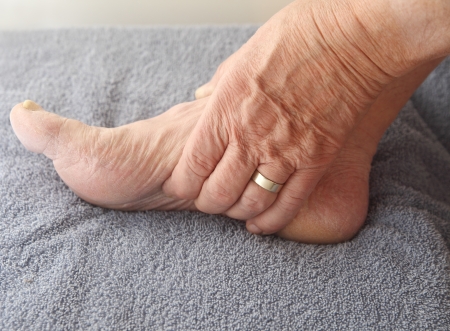You may be familiar with a skin condition called psoriasis that causes a scaly red rash on the body. What you may not know is that the feet can also show symptoms of psoriasis.
August is a particularly good time to learn more about this skin problem because it is recognized as Psoriasis Awareness Month. Up to 7.5 million Americans have psoriasis, a non-contagious autoimmune disease that causes accumulations of white dead skin cells to appear as patches on the skin.
One complication of psoriasis is psoriatic arthritis, a painful and joint-damaging form of arthritis.
Psoriasis may run in families, and those with other autoimmune diseases may be more susceptible. Some triggers include recent injury or sunburn, emotional stress, extremely dry weather, illness, infection, and certain medications.
Symptoms of Psoriasis on the Feet
The most common type of psoriasis is plaque psoriasis with red, dry patches of skin. The patches can appear anywhere on the body, including the feet. Usually, they are covered in silvery scales and can be sore and itchy.
A less common type of psoriasis is palmoplantar pustulosis, affecting the soles of the feet and the palms of the hand. Here you will find tiny, pus-filled blisters.
It’s easy to confuse psoriasis with athlete’s foot, a common foot fungal infection that is very contagious. Athlete’s foot most often appears between the toes or under the nails, while psoriasis is found on the soles. While athlete’s foot is itchy, psoriasis on the foot can be painful and sore.
Treating Psoriasis on the Feet
Since psoriasis on the feet can resemble other skin problems like athlete’s foot, please come in for a professional assessment and the right treatment.
There is no cure for psoriasis, but there are treatments to relieve symptoms and lessen flare-ups. Treatments can include:
Topical cream, ointment, or oil prescription medication.
Light therapy where the patient is exposed to ultraviolet light in a clinic or hospital.
Oral and injected prescription drugs.
You can make lifestyle changes to help reduce or prevent psoriasis flare-ups. These include maintaining a healthy weight, stopping smoking, reducing alcohol, exercising, keeping the skin moisturized, keeping a symptom diary to identify triggers, using yoga or meditation to reduce stress.
We Can Help with Any Skin Problem on the Feet
Foot or toe pain is not normal! If you have any discomfort from arthritis, an injury or just from overuse, please call Michele Kurlanski, DPM at Lighthouse Foot and Ankle Center. Dr. Kurlanski offers expert and professional podiatry services in Cumberland County, Maine. Please call us today at 207-774-0028 to schedule your appointment in our Scarborough office.


